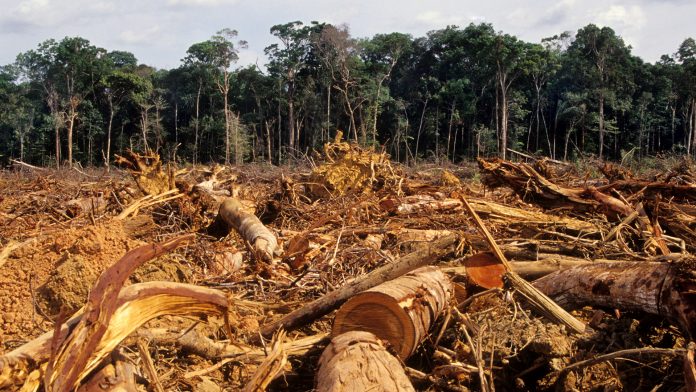Researchers from the German Center of Integrative Biodiversity Research (iDiv) and Leipzig University have identified crucial links between land tenure and tropical deforestation in Brazil.
The research, published in Nature Communications, highlighted that poorly defined land rights amount to increased deforestation rates.
Land tenure policies govern how and by whom land can be used. Therefore, changes in these policies, such as privatisation or placing them under environmental protection, can have implications on forests. Privatisation is often promoted in tropical forests, but the team found that the effects of deforestation can only be mitigated if combined with strict environmental policies.
Increases in tropical deforestation
Brazil’s tropical forests harbour the world’s largest biodiversity and carbon stores; however, increasing pressure from agroeconomic development leads to widespread deforestation.
The researchers analysed 33 years’ worth of agriculture-driven deforestation across Brazilian tropical forests. They compared six land tenure regimes, including undesignated, private, protected, and indigenous land, to compare how different regimes affect tropical deforestation.
They found that publicly owned land with poorly defined tenure rights consistently increased deforestation when compared with all other options. These forests are neither titled nor designated for any use, but may be inhabited by rural settlers with little-to-no property rights. They account for around 100 million hectares in Brazil.
“High deforestation rates in these lands may have many reasons,” said Andrea Pacheco, who led the study. “For example, the government may not have the capacity to effectively monitor on-the-ground deforestation in these lands, resulting in limited enforcement of illegal deforestation here.
“This, in turn, can attract speculators who clear forests to later claim use rights. Alternatively, poor landless settlers may feel forced to illegally clear these lands for agriculture, if prices on legal land markets are too high for them.”
Dr Carsten Meyer, from iDiv, added: “This is why land tenure interventions on these lands are so important. Our study shows that whatever alternative tenure regime with well-defined rights and regulations is implemented, it would likely help reduce this deforestation.”
Can private regimes help with decreasing the effects of deforestation?
“Privatising undesignated and untitled lands can be highly effective as a means to reduce deforestation, but only under certain conditions and if associated with strict environmental policies. If this is not the case, deforestation may actually increase,” Meyer explained. For instance, the Forest Code throughout the Amazon requires landowners to maintain 80% of their land under native vegetation.
Despite this, private land tenures are likely to decrease deforestation less effectively, and less reliably than other well-defined alternatives. The researchers discovered that both strictly protected areas, and sustainable use protected areas most reliably reduced tropical deforestation rates across Brazil.
The research also presented the effects of land tenure held by indigenous people and local communities (IPLCs). They found that privatisation of these lands would likely increase the risk of tropical deforestation across Brazil.
“As much of the world’s remaining forestlands are in IPLC lands, taking local contexts into account will be essential for designing policies with synergies for both biodiversity conservation and IPLCs,” Pacheco explained.
Through presenting their discoveries, the researchers have shown that interventions in undesignated and untitled lands are important for the future of tropical forests. Moreover, coupling private land with strict environmental policies has the potential to protect biodiversity in Brazil’s forests, as many remain under private ownership.
Against the backdrop of ongoing political debate in Brazil, around land privatisation and protection in tropical landscapes, the study can be used to envisage policy aligned with sustainable development goals.









